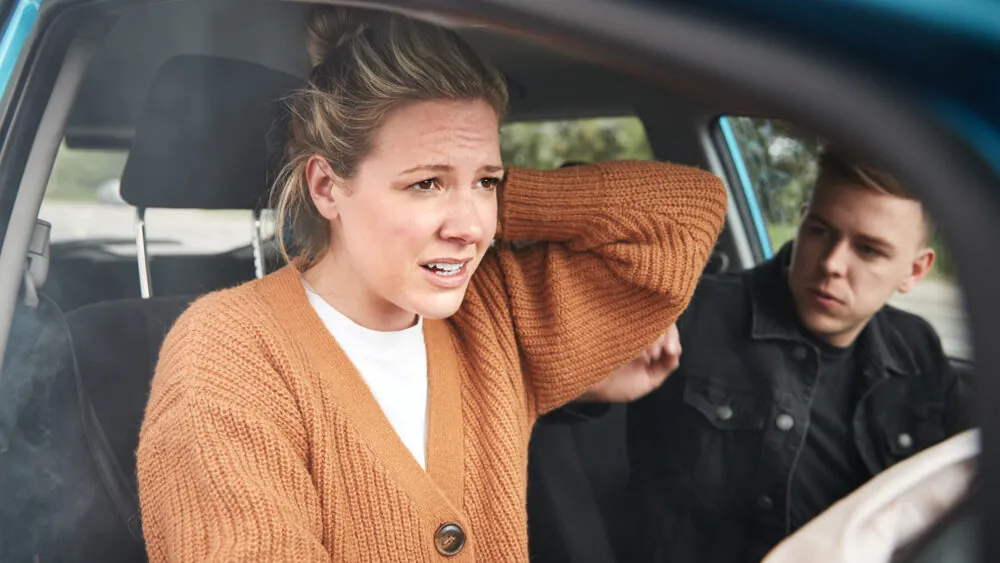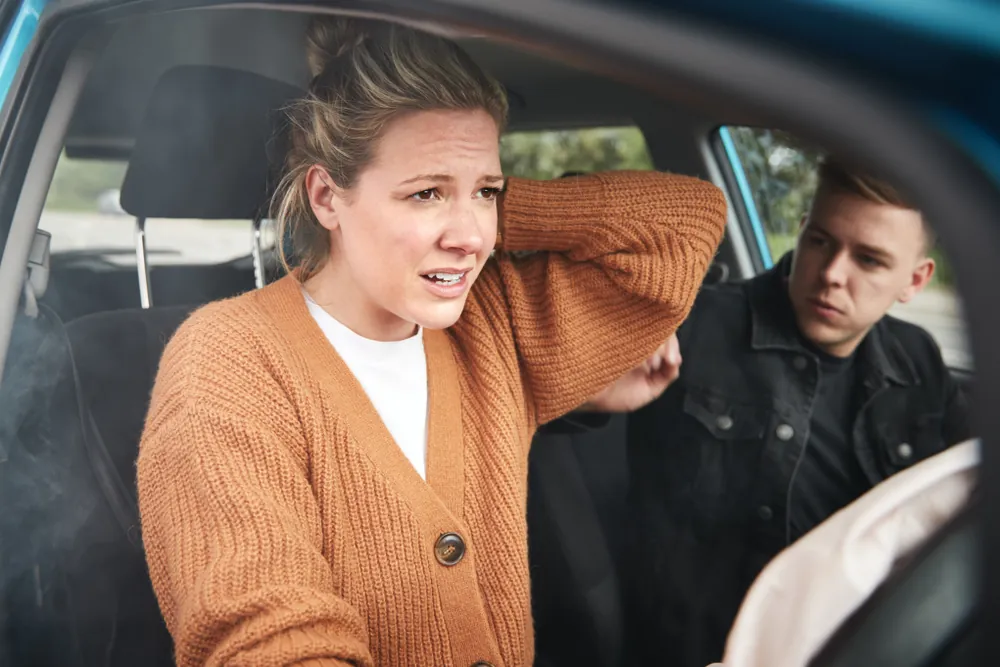Common Passenger Injuries in Car Accidents and Their Legal Implications
Car accidents are unexpected and often devastating events that can lead to severe injuries, not only for drivers but also for passengers. Despite being more vulnerable due to a lack of control over the vehicle, passengers are often unaware of their legal rights and compensation options. This article provides a comprehensive guide on common passenger injuries, legal implications, liability issues, and the steps necessary to file a compensation claim.
If you or a loved one has been injured as a passenger in a car accident, understanding your rights can make a significant difference in your recovery and financial compensation. Whether you were injured in a rear-end collision, a multi-vehicle accident, or any other type of crash, this guide will help you navigate the complex legal landscape and pursue the compensation you deserve.

Overview of Passenger Injuries in Car Accidents
Car accidents can result in a wide range of injuries, from minor bruises to life-threatening trauma. Passengers are at risk regardless of where they are seated in the vehicle. The severity of the injuries depends on several factors, including the impact’s force, the vehicle’s safety features, and the use of seatbelts.
Common Types of Passenger Injuries
- Whiplash Injuries
Whiplash is one of the most common injuries in rear-end collisions. It occurs when the neck is suddenly jerked forward and backward, straining the neck muscles and ligaments. Symptoms may include neck pain, stiffness, headaches, and dizziness. In severe cases, whiplash can lead to chronic pain and long-term disability. - Head and Brain Injuries
Traumatic brain injuries (TBI) can occur when a passenger’s head strikes a hard surface, such as the window, dashboard, or seat in front of them. Concussions, skull fractures, and brain contusions are common. Even minor head injuries can have serious long-term effects on cognitive and emotional health. - Spinal Cord Injuries
High-impact collisions can cause spinal cord injuries, leading to partial or complete paralysis. These injuries often require long-term medical care and rehabilitation, significantly impacting the victim’s quality of life. - Seatbelt Injuries
While seatbelts save lives, they can also cause injuries, including bruising, rib fractures, and internal organ damage during high-impact accidents. Improper use of seatbelts, such as placing the strap behind the back or under the arm, increases the risk of serious injury. - Broken Bones and Fractures
Broken ribs, arms, legs, and pelvic fractures are common due to the force of the collision. These injuries often require surgery, physical therapy, and extended recovery periods. - Emotional Distress and Psychological Trauma
Beyond physical injuries, car accidents can cause significant emotional distress, including anxiety, depression, and post-traumatic stress disorder (PTSD). Psychological injuries can be just as debilitating as physical ones and may require long-term counseling or psychiatric care.
Factors Influencing the Severity of Injuries
- Speed of Collision: Higher speeds result in more severe injuries due to the greater force of impact.
- Impact Location: The side, front, or rear impact location influences the type and severity of injuries.
- Passenger Position: Front-seat passengers are more likely to suffer head and chest injuries, while rear-seat passengers are prone to whiplash and leg injuries.
- Use of Safety Devices: Proper seatbelt use and functioning airbags significantly reduce the severity of injuries.
- Vehicle Safety Features: Modern vehicles with advanced safety features, such as side airbags and crumple zones, offer better protection for passengers.
Legal Implications of Passenger Injuries
Navigating the legal implications of passenger injuries can be complex. Knowing your legal rights and understanding the implications of liability are crucial to receiving fair compensation.
Understanding Liability for Passenger Injuries
In most car accident cases, passengers are considered innocent victims. They are rarely at fault and have the legal right to seek compensation for their injuries, regardless of who caused the accident. Liability for passenger injuries typically falls on one or more of the following parties:
- The Driver of the Vehicle in Which the Passenger Was Riding: If the driver’s negligence, such as speeding, distracted driving, or impaired driving, caused the accident.
- Another Driver Involved in the Accident: If another driver’s actions led to the collision.
- Multiple Parties: In multi-vehicle accidents, liability can be shared among several drivers.
- Vehicle Manufacturers or Maintenance Providers: In cases where a vehicle defect or mechanical failure contributed to the accident.
Legal Rights of Injured Car Passengers
Injured passengers have the legal right to:
- File a personal injury claim against the at-fault driver’s insurance.
- Seek compensation for medical expenses, lost wages, pain and suffering, and emotional distress.
- Pursue a lawsuit for negligence if insurance coverage is insufficient to cover their damages.
- File claims against multiple parties if more than one party is at fault.
- Receive compensation regardless of who was driving — even if the at-fault driver was a family member or friend.
Role of Fault in Passenger Injury Claims
In some states, comparative negligence laws apply, which means a passenger’s compensation may be reduced if they are found partially responsible for their injuries. For example, not wearing a seatbelt could impact the amount of compensation awarded.
- Contributory Negligence: In a few states, if the passenger is found even slightly at fault, they may be barred from recovering compensation.
- Comparative Negligence: In other states, compensation is reduced by the passenger’s percentage of fault.
Filing Passenger Injury Claims
Filing a personal injury claim as a passenger involves several steps and requires gathering substantial evidence. Understanding the claims process is essential for maximizing compensation.
How to File a Claim for Passenger Injury
- Seek Immediate Medical Attention
Always prioritize health and safety by seeking medical help after an accident. Document all injuries, as medical records are crucial for your claim. - Document the Accident Scene
Collect evidence, including photos of the accident scene, vehicle damage, and visible injuries. These can be valuable in establishing fault. - Gather Witness Statements
Obtain contact information and statements from witnesses who saw the accident occur. - Report the Accident
File a police report and notify all relevant insurance companies. Inaccurate or incomplete reports can complicate the claims process. - Consult a Personal Injury Lawyer
Legal guidance is crucial to navigating the complexities of passenger injury claims. An attorney can negotiate with insurance companies and help you understand your rights.
Required Documents and Evidence
- Medical Records and Bills: Proof of injury and associated expenses.
- Accident Report: The official police report detailing the incident.
- Proof of Lost Wages: Documentation showing income lost due to injury.
- Witness Statements: Supporting the passenger’s account of the accident.
- Insurance Information: From all drivers involved in the accident.
Statute of Limitations for Passenger Injury Claims
Each state has a specific statute of limitations for filing personal injury claims, generally ranging from 2 to 4 years. Missing this deadline can result in losing the right to seek compensation.
Compensation for Injured Passengers
Understanding the types of compensation available and how to calculate settlements can significantly impact the outcome of a passenger injury claim.
Types of Compensation Available
- Medical Expenses: Covers emergency care, surgeries, medication, rehabilitation, and ongoing treatment.
- Lost Wages: Compensation for income lost due to the injury.
- Pain and Suffering: Non-economic damages for physical pain and emotional distress.
- Emotional Distress: Compensation for anxiety, depression, PTSD, and other psychological impacts.
- Loss of Consortium: Compensation for negative effects on relationships with family members.
- Punitive Damages: In cases of gross negligence, the court may award punitive damages to punish the at-fault party.
Calculating Passenger Injury Settlements
Insurance companies typically calculate compensation using a multiplier method that considers:
- Economic Damages: Medical expenses, lost wages, property damage.
- Non-Economic Damages: Pain and suffering, emotional distress.
- Severity and Impact: The long-term impact of the injuries on the victim’s life.
Frequently Asked Questions (FAQs) on Passenger Injuries and Compensation
Who is liable for passenger injuries in a car accident?
Liability for passenger injuries typically depends on who was at fault for the accident. It could be the driver of the car the passenger was riding in, another driver involved in the accident, or multiple parties in the case of multi-vehicle collisions. In some cases, vehicle manufacturers or maintenance providers could also be held liable if a defect or mechanical failure contributed to the accident. Regardless of who is at fault, passengers are generally considered innocent victims and have the right to pursue compensation from the responsible parties.
Can a passenger sue the driver for injuries?
Yes, a passenger can sue the driver of the vehicle they were in if that driver’s negligence caused the accident. This can include instances of reckless driving, distracted driving, impaired driving, or any other form of negligence. Passengers can also file claims against other at-fault drivers involved in the collision. It’s important to note that suing a friend or family member can be sensitive, but claims are typically handled through insurance companies rather than personal finances.
What compensation can passengers receive for car accident injuries?
Passengers can receive compensation for various damages, including medical expenses, lost wages, pain and suffering, emotional distress, and loss of enjoyment of life. In cases of severe injuries, compensation may also include future medical expenses and long-term care costs. Additionally, punitive damages may be awarded in cases of gross negligence or intentional harm.
How long does it take to settle a passenger injury claim?
The time it takes to settle a passenger injury claim varies depending on the complexity of the case, the severity of the injuries, and the willingness of the insurance companies to negotiate. Simple cases with minor injuries can be settled within a few months, while more complex cases involving severe injuries, multiple parties, or disputes over liability can take 1 to 2 years or longer.
Do passengers have the same legal rights as drivers in accidents?
Yes, passengers have the same legal rights as drivers when it comes to seeking compensation for injuries sustained in a car accident. Passengers are generally considered innocent victims, and they can file claims against any at-fault party involved in the accident. They are also entitled to the same types of compensation as drivers, including medical expenses, lost wages, and pain and suffering.
Contact Lawlor, White & Murphey Today
If you or a loved one has been injured as a passenger in a car accident, understanding your legal rights and pursuing the compensation you deserve is crucial. Contact Lawlor, White & Murphey today to evaluate your case, guide you through the claims process, and fight for your right to fair compensation. Protect your rights and ensure justice is served.
